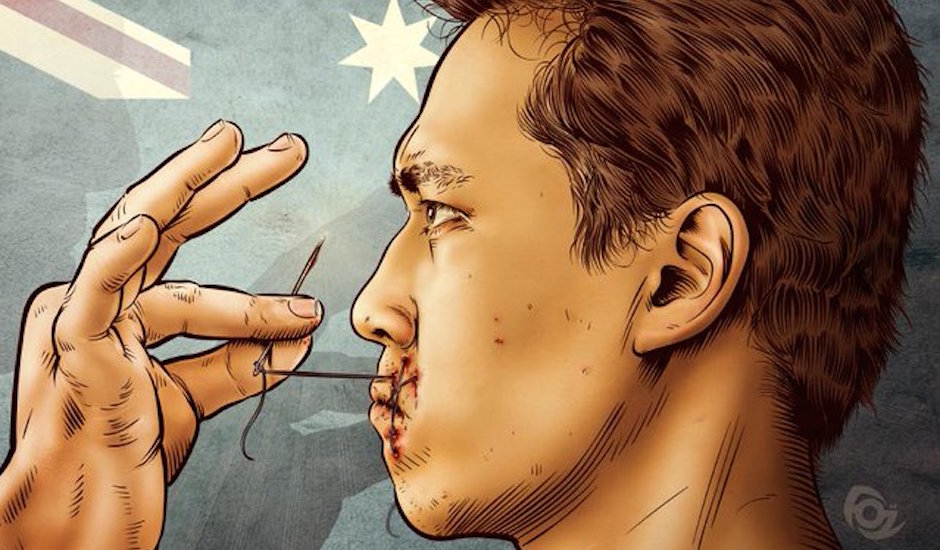 We asked a bunch of musicians what matters to them in the lead-up to this electionSick of jobs & growth? Then this is for you.
We asked a bunch of musicians what matters to them in the lead-up to this electionSick of jobs & growth? Then this is for you.

Meet a teenage asylum seeker/aspiring musician stuck on Nauru for 3 years: "All of us are just burning and dying."
An interview with 19-year-old Iranian refugee, "R".
Words by Henry Squire
The header image, by James Fosdike, has been cropped from its original form, which you can check HERE.
Henry Squire is a freelance journalist from Western Australia, working primarily in the Middle East. He is currently covering the refugee crisis in Greece.
-
Ever since I can remember, I’ve been a writer. It has always been an inherent part of me. If I wasn't scribbling thoughts down, I was nose deep into a book, face inches away from the page. At times I’ve cursed this trait, but I’ve learnt to accept, sometimes reluctantly, that this is part of who I am. Now I can’t really imagine my life without it. I have no idea what I would do with myself.
The freedom I’ve enjoyed all my life to pursue this has not been afforded to a 19 year old Iranian girl who I will call R. I came into contact with R when I returned to Oman after a short break in Iran. I was lucky enough to meet a generous man in Iran who had been held in the detention facility on Manus Island and helped me make contact with those still there and on Nauru. I was struck by R’s heartrending poems of life on Nauru and touched by her story, so we organised some interviews.
R says she had a pleasant life growing up in Tehran, the country’s capital. Loving parents, plenty of friends and a nice neighbourhood, the only thing that plagued her childhood was her inability to pursue what she truly loved, learning and playing music.
In Iran, the restrictions on women performing are at best prohibitive, and at worst, a threat to your freedom or wellbeing. The punishments range from jail time to 100 lashes across your back, both designed to serve as a brutal reminder of the cost of your art.
R first started thinking about leaving Iran when she was 14. Despite the lack of support from her friends and family, who were constantly reminding her that there’s “no future for you [in Iran] if you continue showing interest in music”, her passion continued to grow. She was 16 when she left with her father and brother.
They arrived in Indonesia in July 2013. R says she didn’t feel the gravity of the situation until two weeks after they landed, when they heard from their smuggler contact, who told them that there was a van arriving shortly. Then the fear started to set in. They drove for eight hours before stopping and being told to get out. In the pitch black she could barely make out the forms of her father and brother, as they were hurried into the back of a truck, already crammed with other people and the stench of bodies. They drove for another seven hours before arriving at the boat. R recalls quite clearly that it rained three times while in the back of that truck.
I asked R about the boat journey between Indonesia and Christmas Island, but she says that she does not want to recall it. The voyage has obviously left its mark. Nevertheless, after three days on the smuggler’s boat and a day with the Australian Navy they arrived at Christmas Island.
Initially they were hopeful about their prospects after arriving at the tiny island’s processing centre, but that hope slowly dwindled as asylum seekers who had been intercepted before the 19th of July were transferred to Australia and those after were left behind. When they heard the news that they would be transferred to Nauru, they were in a state of disbelief. After seven months of being held on Christmas Island, mental illness was already rife amongst the asylum seekers.
R recalls the period of transferring bitterly; “They moved us like slaves, they searched our bags...even searched our bodies and we were not even allowed to wear shoes. Women could not have any head bands. And even they forced some people to pack their stuff and move…just like we were slaves. And after that everything was finished, we came to hell and from the day we reached here all of us are just burning and dying every night.” A few days after I spoke to R for the first time, Omid Masoumali, a 23 year old Iranian, set himself on fire in front of UNCHR representatives and later succumbed to his injuries.
R has been detained on Nauru for three years now. A year ago, R reached her breaking point and decided to attempt suicide. She sourced some pills from inside the camp and swallowed all of them. Her friend found her not long after, with pale skin and darkened eyes in her room and notified the security in the compound. Several months later, R sewed her mouth shut along with other asylum seekers as part of a protest. She kept the stitches in for 10 hours before her brother found her. Upon seeing his younger sister in that state, he broke down into tears and begged her to take them out. About six months after her first suicide attempt, R again reached the point where she could no longer take the conditions on Nauru. She took a razor to her wrist, but her father found her not long after she started bleeding and took her to the medical facilities. She bitterly remembers how she survived both these attempts on her own life. R says that what keeps her from making further attempts is trying to remain strong for her mother and sister back in Iran, who she hasn’t seen for three years, but she is entirely unsure if that will be enough.
This is not something that should have to be reiterated, but people don’t attempt suicide unless they have been pushed to their very edge. This story comes after a spate of self-harm incidents on Nauru and Manus Island - a Somalian girl set herself on fire not long after Omid did the same. Recently, an Iranian woman locked herself in her building unit and set it alight in an attempt to take her own life.
By the time this story gets published, there will no doubt be more people who have been harmed, whether by their own hands or at the hands of others.
As I was finishing my final interview with R, she asked me if I could do a favour for her. Not wanting to make promises that I might not be able to keep, I said I would see what I could do. She asked that when I write her story, could I publish a poem she wrote as a farewell for Omid. R and her brother were close friends of Omid and the brutal circumstances of his death has shaken them both to their core. I agreed to include it, and her poem is as follows:
“Farewell”
Goodnight my friend
This agony will never mend
You couldn’t withstand anymore
Couldn’t survive this burning tor
Hope you’re resting in peace
And your soul has no more grief
I saw how quiet you slept
I dunno how many more tears are left
Farewell,
Farewell my friend
My pain
My pain will never end
I wish this was all in jest
But something has broken inside my chest
You’ll never wake up again
Not even with the sound of rain
So sleep in your dark grave
I’ll see you in another place
Where only the dead are living
Where no one has any feeling
I can’t explain my pain with words
Can’t say how much I hate this world
Farewell,
Farewell my friend
My pain,
My pain will never end
I wish this was all in jest
Something has broken
In my chest
Oh, there’s no helper in this world
Not even the one they call Lord
I’m so numb from this burning cold
So,
Goodnight my friend,
Goodnight till the end of my time.
-R
 We asked a bunch of musicians what matters to them in the lead-up to this electionSick of jobs & growth? Then this is for you.
We asked a bunch of musicians what matters to them in the lead-up to this electionSick of jobs & growth? Then this is for you.
 Idiocracy 2016When dumb people are given a bigger microphone, they use it to spread fear, hatred, bigotry and uninformed decisions.
Idiocracy 2016When dumb people are given a bigger microphone, they use it to spread fear, hatred, bigotry and uninformed decisions.